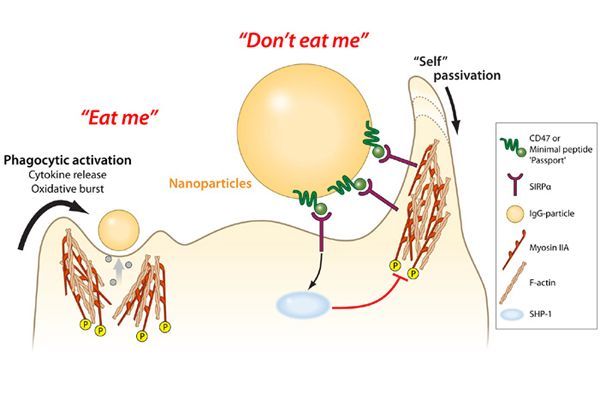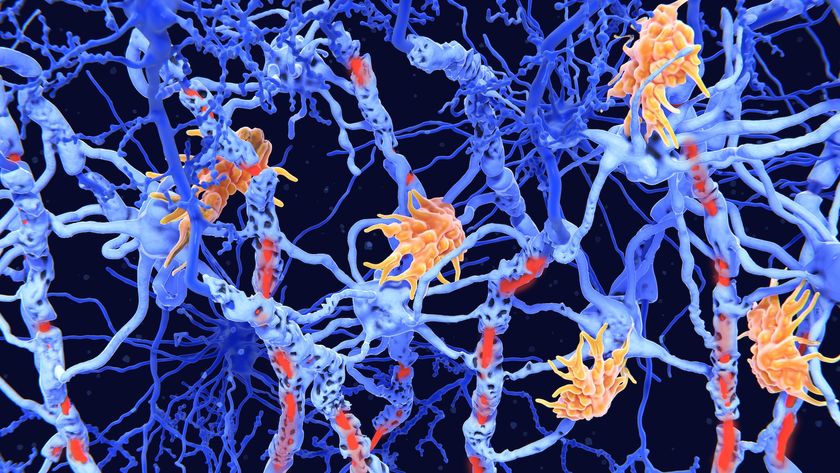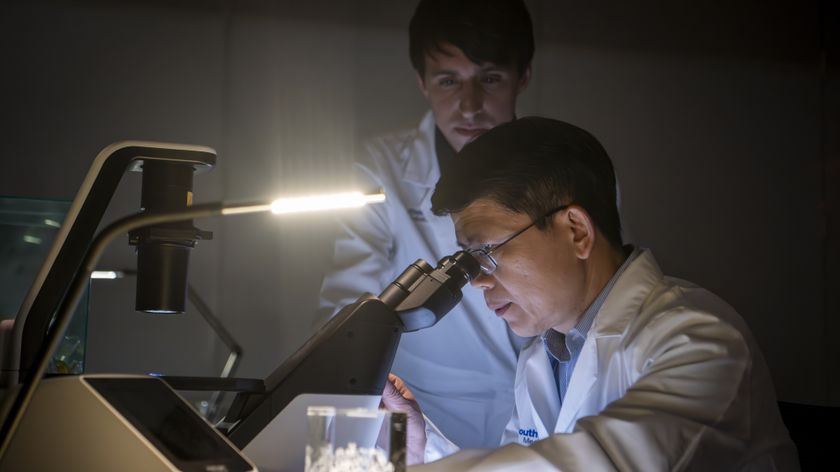Protein 'Passports' Fool Immune System To Deliver Medical Nanoparticles

(ISNS) -- The body's immune system evolved to identify and destroy foreign objects that pose a threat, and it's very good at it. What it's not so good at is distinguishing between harmful invaders and the implants and nanoparticles used in medical treatments.
But researchers at the University of Pennsylvania think they have found a way to trick the immune system. By marking nanoparticles with a customized protein fragment – a sort of molecular "passport" – researchers enabled the immune system to recognize the foreign particles and let them through its defenses.
White blood cells called macrophages – Greek for "giant eaters" – detect, engulf, and get rid of invaders, and they're a key component of the immune system. Dennis Discher, a biophysicist at the University of Pennsylvania, in Philadelphia, led the team that published the research last month in the journal Science. He likens the cells to guards at the border between two countries.
"The passport lets nanoparticles get past those border guards," said Discher.
The passport is based on a protein found on nearly all mammalian cell membranes, CD47, which is known as a marker of "self." While the "adaptive" immune system uses antibodies formed after an illness or vaccination to respond to known threats, the "innate" immune system - which includes macrophages - targets anything it doesn't recognize. If a macrophage receptor called SIRPa binds to a cell's CD47 protein, the macrophage identifies the cell as native to the body.
Researchers first discovered CD47's role in 2000, while studying the protein in mice. Eight years later, Discher was part of the team of researchers who showed it played the same role in humans. But since there are half a dozen variants of CD47 in the human population, researchers wanted to develop a smaller, more universal version of the protein before testing the passport in living organisms, Discher said.
They designed a "minimal peptide" – the smallest possible sequence of amino acids that still acts like the larger CD47 protein, binding with the SIRPa receptor and passing the macrophage's passport check.
Sign up for the Live Science daily newsletter now
Get the world’s most fascinating discoveries delivered straight to your inbox.
"Most of the contacts between the peptide and the receptor are lost," Discher said. "It's a bit surprising that it's enough to interact and signal as effectively as it does."
To test the peptide passport, researchers injected mice with two kinds of nanoparticles: half carrying the "self" peptide, half without. After half an hour, up to four times as many nanoparticles with the peptide remained in the blood as unmarked nanoparticles. And when researchers compared nanoparticles loaded with the cancer drug paclitaxel to those without it, particles with the peptide were better at shrinking tumors.
"This is real evidence that this peptide was keeping particles from being removed by macrophages. What that gives you is a particle that circulates in the body longer and lets you do better tumor imaging, better drug delivery," Discher said.
Samir Mitagotri, a chemical engineering professor at the University of California at Santa Barbara who also studies medicine but was not involved in Discher's work, said the results were "quite remarkable."
"A problem everyone in the field faces is how you keep nanoparticles away from the liver and spleen, where there are lots of macrophages, and give them the opportunity to get to the target organ," Mitragotri said.
Previously, researchers tried to help nanoparticles avoid detection by coating them with whisker-like compounds known as polymer brushes, which mimic a cell's natural coating. The coatings can fool the immune system for a while, Mitragotri said, but macrophages will eventually recognize the particles and destroy them.
"Conceptually, it's a different approach," Mitragotri explained. "[The coating] tries to send the signal, ‘Ignore me,' to reduce interaction. The peptide sends the signal, ‘I'm one of you.'"
Now Discher is exploring whether the peptide passport would work for viruses as well. Since viruses spread so efficiently, they can treat disease by delivering therapeutic DNA that alters genes within an individual's cells. Viral gene therapy could be even more effective than nanoparticle drug-delivery vehicles, Discher said, if viruses can get past the immune system's defenses.
"We have many more disease models and animals to study, but we're showing that the peptide passport generally works even on viruses and already validating our initial results," Discher said.
Inside Science News Service is supported by the American Institute of Physics.












